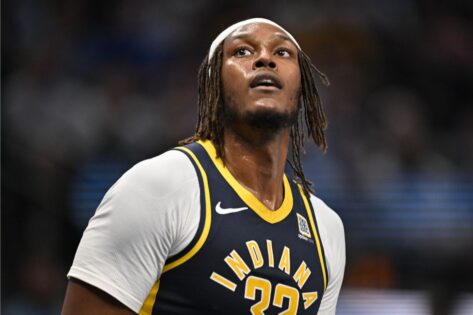While Indiana was preparing for their must-win Finals Game 6, their front office was busy elsewhere, cutting a deal. When most teams are laser-focused on their postseason run or the upcoming draft. Indiana made waves by trading their No.23 overall pick in the 2025 NBA Draft. And the rights to guard Mojave King to the New Orleans Pelicans in exchange for their 2026 first-round pick.
It is a rare sight to see a Finals participant making a transaction with the draft still days away and a championship still in play. But behind the odd timing lies a deliberate and calculated move. A move that reveals where Pacers’ front office is headed and how they view their window of contention.
Though shocking but it looked like a fairly minor exchange when ESPN’s Shams Charania reported the trade. Swapping a late first-rounder and the rights to an overseas prospect for a pick two years down the road. Mojave King, a 2023 second-rounder whose rights the Pacers owned, has spent time in the G League and overseas, never cracking an NBA roster. On paper, this was not a blockbuster.
NBA draft deal: The Indiana Pacers are trading their No. 23 pick and the rights to Mojave King to the New Orleans Pelicans for Indiana’s own 2026 first-round pick back which the Pelicans had previously acquired, sources tell ESPN.
— Shams Charania (@ShamsCharania) June 17, 2025
This trade gives the Pacers something they badly needed: freedom. By reacquiring their 2026 first-round pick, which had been dealt to Toronto in the Pascal Siakam trade. Later, flipped to New Orleans, the Pacers regain full control over their draft future.
Let us take a deeper look at this deal.
Is this just a draft move, or a calculated gamble?
The Pacers are eyeing long-term flexibility as key extension decisions loom—Bennedict Mathurin becomes eligible for a rookie-scale extension in 2025 (effective 2026-27), followed by Jarace Walker in 2026. Fortunately, the franchise has some breathing room. According to Bobby Marks, Indiana is projected to be $20 million below the luxury tax threshold heading into the offseason.
Trading away the No. 23 pick shaved another $3.24 million off their books, helping them preserve a clean cap sheet. That’s especially valuable for a team that hasn’t paid the luxury tax since the 2005-06 season—a streak they’re clearly intent on keeping alive.
Crucial as the team prepares to re-sign Myles Turner, and potentially extend other key players. ESPN’s Bobby Marks noted that the Pacers are now bracing to enter the luxury tax for the first time in years. Shedding that salary helps them manage the team threshold while keeping the core together, especially Turner, who is an unrestricted free agent this summer.
Moreover, due to NBA rules prohibiting teams from trading first-round picks in consecutive years, the Pacers’ options on the trade market were severely limited. But that changes now. They can now trade their first-rounders in 2026, 2028, 2030, and 2032, along with swap rights in 2027, 2029, and 2031. Before the deal, protections tied to that pick through 2027 had them stuck—only 2024, 2029, and 2031 were in play. Now, Indiana has far more leverage in future trade talks.For a team built to contend with Tyrese Haliburton, Pascal Siakam, and hopefully Myles Turner.
By executing this trade during the NBA Finals, Indiana sent a signal, not just to the league, but to their own players and fans. This isn’t a team satisfied with just reaching the Finals. This is a team planning to stay there.
The post Why Did the Pacers Make a Trade During NBA Finals? Myles Turner’s Future Decided as Details Emerge appeared first on EssentiallySports.
